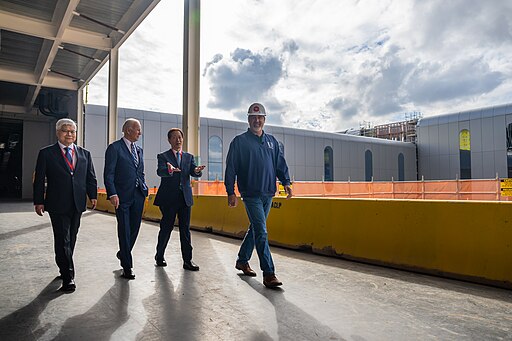TSMC's new Arizona plant faces delays in adopting advanced chip technology, as compliance hurdles, local regulations, and permitting complexities slow progress compared to Taiwan, CEO C.C. Wei said. Building the factory has taken twice as long as in Taiwan due to extensive permitting processes, Wei shared during a National Taiwan University event.
The Taiwanese semiconductor giant, a leading supplier for companies like Apple and Nvidia, is investing $65 billion in three Arizona factories. Despite this, TSMC plans to retain its most advanced chip production in Taiwan. Wei emphasized that while he remains confident the Arizona facility will match Taiwan’s chip quality, challenges like skilled labor shortages, supply chain gaps, and high regulatory costs have extended timelines.
To address regulatory issues, TSMC established 18,000 rules, incurring $35 million in costs and forming a specialized team to collaborate with local authorities. The company also grappled with high chemical costs, shipping materials like sulfuric acid from Taiwan to the U.S., and significant labor shortages, relocating half of the construction workforce from Texas to Arizona.
The U.S. government, aiming to reduce reliance on Asian chip manufacturing, has supported TSMC's investment with a $6.6 billion grant. Commerce Secretary Gina Raimondo recently announced the production of 4-nanometer chips for U.S. customers in Arizona, marking a key milestone in the Biden administration's semiconductor strategy. Despite progress, Wei underscored that operational efficiency in the U.S. remains far from Taiwan’s standards, delaying access to TSMC’s most advanced technology.



 Uber Ordered to Pay $8.5 Million in Bellwether Sexual Assault Lawsuit
Uber Ordered to Pay $8.5 Million in Bellwether Sexual Assault Lawsuit  Missouri Judge Dismisses Lawsuit Challenging Starbucks’ Diversity and Inclusion Policies
Missouri Judge Dismisses Lawsuit Challenging Starbucks’ Diversity and Inclusion Policies  Nasdaq Proposes Fast-Track Rule to Accelerate Index Inclusion for Major New Listings
Nasdaq Proposes Fast-Track Rule to Accelerate Index Inclusion for Major New Listings  Rio Tinto Shares Hit Record High After Ending Glencore Merger Talks
Rio Tinto Shares Hit Record High After Ending Glencore Merger Talks  Federal Reserve Faces Subpoena Delay Amid Investigation Into Chair Jerome Powell
Federal Reserve Faces Subpoena Delay Amid Investigation Into Chair Jerome Powell  AMD Shares Slide Despite Earnings Beat as Cautious Revenue Outlook Weighs on Stock
AMD Shares Slide Despite Earnings Beat as Cautious Revenue Outlook Weighs on Stock  Federal Judge Blocks Trump Administration Move to End TPS for Haitian Immigrants
Federal Judge Blocks Trump Administration Move to End TPS for Haitian Immigrants  US Judge Rejects $2.36B Penalty Bid Against Google in Privacy Data Case
US Judge Rejects $2.36B Penalty Bid Against Google in Privacy Data Case  FDA Targets Hims & Hers Over $49 Weight-Loss Pill, Raising Legal and Safety Concerns
FDA Targets Hims & Hers Over $49 Weight-Loss Pill, Raising Legal and Safety Concerns  Tencent Shares Slide After WeChat Restricts YuanBao AI Promotional Links
Tencent Shares Slide After WeChat Restricts YuanBao AI Promotional Links  California Sues Trump Administration Over Federal Authority on Sable Offshore Pipelines
California Sues Trump Administration Over Federal Authority on Sable Offshore Pipelines  TSMC Eyes 3nm Chip Production in Japan with $17 Billion Kumamoto Investment
TSMC Eyes 3nm Chip Production in Japan with $17 Billion Kumamoto Investment  OpenAI Expands Enterprise AI Strategy With Major Hiring Push Ahead of New Business Offering
OpenAI Expands Enterprise AI Strategy With Major Hiring Push Ahead of New Business Offering  Supreme Court Tests Federal Reserve Independence Amid Trump’s Bid to Fire Lisa Cook
Supreme Court Tests Federal Reserve Independence Amid Trump’s Bid to Fire Lisa Cook  Federal Judge Restores Funding for Gateway Rail Tunnel Project
Federal Judge Restores Funding for Gateway Rail Tunnel Project  Amazon Stock Rebounds After Earnings as $200B Capex Plan Sparks AI Spending Debate
Amazon Stock Rebounds After Earnings as $200B Capex Plan Sparks AI Spending Debate  SpaceX Pushes for Early Stock Index Inclusion Ahead of Potential Record-Breaking IPO
SpaceX Pushes for Early Stock Index Inclusion Ahead of Potential Record-Breaking IPO 




























